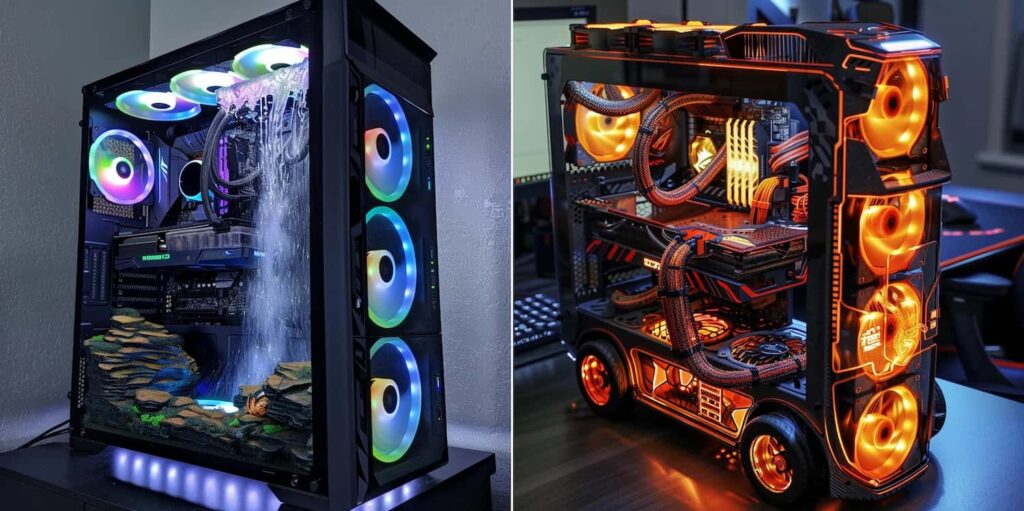The announcement of the PS5 Pro has stirred up quite the buzz, and many are wondering how it stacks up against a custom-built PC. With the PS5 Pro promising enhanced performance and features, it’s a great time to dive into whether you can build a PC that matches or even exceeds its capabilities. Let’s break it down and see if we can come close to the PS5 Pro’s performance with a DIY PC build, while keeping it budget-friendly.
Key Takeaways
- PS5 Pro Specs: The PS5 Pro features a significant GPU upgrade with increased compute units, fast storage, and an older CPU architecture.
- Building a PC: We’ll use Micro Center’s configurator to build a comparable PC and see if we can stay within the $700 price range.
- Challenges: Balancing performance, price, and component compatibility is key.
The PS5 Pro: What’s Inside?
The PS5 Pro is an upgrade from the original PS5, boasting several key enhancements:
- GPU: The PS5 Pro includes an AMD GPU with a 67% increase in compute units compared to the base PS5, which equates to around 60 compute units. This aims to deliver significantly better graphics performance.
- Storage: It comes with a speedy 2TB PCIe Gen 4 NVMe SSD, offering quick load times and ample space.
- CPU: The CPU is based on AMD’s Zen 2 architecture, which is somewhat dated but still competent for console gaming. It’s essentially a slightly downclocked version of the Ryzen 3700X.
- Unified RAM: The PS5 Pro uses GDDR6 RAM accessible by both the CPU and GPU, enhancing overall performance.
With these specs in mind, let’s see if we can build a PC that measures up.
Building a Comparable PC
We’ll use Micro Center’s PC Builder to assemble a list of components and match the PS5 Pro’s performance. Here’s how we did it:
1. Processor and Motherboard
For the CPU, we opted for the Intel Core i5-12600KF. It’s a solid choice that, while not the latest, provides strong performance for its price. We paired it with an MSI Z790 motherboard. This setup gives us a modern and reliable base, though it’s a bit overkill for our needs.
Cost: $259.99 (bundle deal)
2. Memory
To keep costs down, we used 16GB of DDR4-3200 RAM. DDR4 is older compared to DDR5, but it’s more affordable and still sufficient for most gaming and general tasks.
Cost: $34.00
3. Storage
The PS5 Pro’s 2TB SSD is impressive, but for our budget, we’ll go with a 1TB PCIe Gen 4 SSD. It’s fast, though not as large as the PS5 Pro’s drive. This SSD will be plenty for most games and can be upgraded later if needed.
Cost: $65.99
4. Case
We chose the Inland X1 case for its value. It comes with four pre-installed fans, which is a bonus for cooling. It fits a full ATX motherboard and is priced reasonably.
Cost: $49.99
5. Power Supply
A 650W power supply gives us room to grow with the system. It’s reliable and offers more wattage than the minimum needed, ensuring stability and future-proofing.
Cost: $49.99
6. Cooling
The Cooler Master Hyper 212 is a cost-effective cooling solution. The i5-12600KF doesn’t come with a stock cooler, so this addition is necessary.
Cost: $20.00
7. Graphics Card
Here’s where things get tricky. With $255 left for a GPU, the best option is the NVIDIA GeForce RTX 3060 Ti. It provides decent performance and supports features like DLSS, which can help with performance and image quality.
Cost: $249.00
Summary of Costs
- CPU & Motherboard: $259.99
- Memory: $34.00
- Storage: $65.99
- Case: $49.99
- Power Supply: $49.99
- Cooling: $20.00
- Graphics Card: $249.00
Total: $749.95
Is It Worth It?
At approximately $750, our PC build is a bit more expensive than the PS5 Pro’s $700 price tag. However, it’s important to note:
- Upgradeable Components: Unlike the PS5 Pro, you can upgrade every component in a PC, offering greater flexibility.
- Operating System: The PS5 Pro includes its operating system, while our PC doesn’t. You’ll need to factor in the cost of an OS if you don’t already have one.
- Gaming Performance: The 3060 Ti should handle most games well, though the PS5 Pro’s GPU might offer a slight edge in some scenarios. The 3060 Ti’s support for DLSS can also enhance performance in supported games.
Conclusion
Building a PC that matches the PS5 Pro’s performance is achievable, though it requires careful selection of components and might stretch your budget a bit. While the PS5 Pro offers a streamlined and cost-effective solution with its integrated design, a custom-built PC offers more flexibility and potential for upgrades.
If you’re considering building a PC, weigh the pros and cons of each option and determine what fits your needs and budget best. Whether you go for the PS5 Pro or a DIY build, both can deliver excellent gaming experiences.




